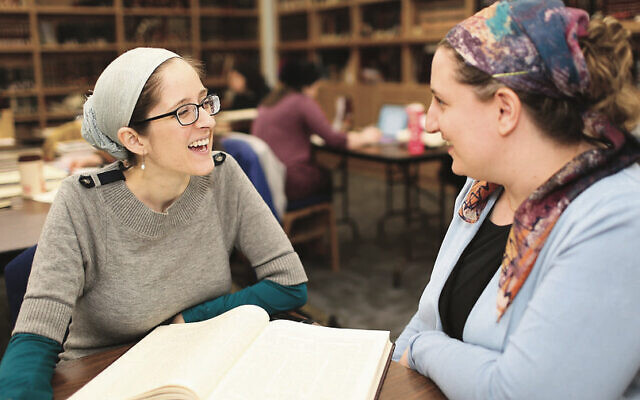Women’s ordination takes off – hesitantly
More Orthodox women are ordained, although equality remains a problem.
While the Reform and Conservative Jewish movements have ordained women rabbis for decades, the Orthodox fold has only recently begun tapping women to leadership roles.
Modern Orthodoxy, which aims to hold onto Jewish tradition while engaging with the outside world, is leading the way.
Rabbanit Dasi Fruchter was earning a graduate degree in nonprofit management and Jewish studies at New York University when she heard about Yeshivat Maharat, the only US seminary that ordains Orthodox Jewish women. Ordained in 2016, she immediately landed a job as an assistant rabbanit at an Orthodox congregation in Potomac, Maryland.
In 2018, Fruchter was approached by a group of foundations interested in creating more leadership positions for Orthodox women. After months scouting potential locations, she settled on South Philadelphia, where the Jewish community has thinned out in recent decades as people migrated to the suburbs.
The congregation she dubbed the Shtiebel (the Yiddish term for a small, homey house of worship) was launched in July 2019 with a Friday night service attended by 75 people in a rented space.
Yeshivat Maharat has ordained 50 Orthodox women since it opened in 2009, and currently has an enrolment of 46 in its three ordination tracks, said Rabba Sara Hurwitz, the school’s co-founder, president, and the first Modern Orthodox woman rabbi ordained in the US.
In Israel, where Orthodoxy is the only branch of Judaism recognised by the state, a handful of seminaries ordain women and a growing number of academies train women in Jewish law. Orthodox women now serve as school principals, community educators and legal authorities.
A rare few, such as Rabbanit Shira Marili-Mirvis, have become leaders at more progressive Orthodox synagogues.
“I never had a dream when I was a girl of being a rabbanit,” said Marili-Mirvis at her home in the West Bank settlement of Efrat, her hair covered in line with Orthodox custom for married women.
“It wasn’t an option. It wasn’t something I saw around me.”
Attending seminary after high school, Marili-Mirvis developed a passion for studying the intricacies of halacha. She eventually enrolled at Ohr Torah Stone, a Jerusalem seminary that teaches Talmud to women with the aim of preparing them to become community leaders.
Several years ago, she moved to Efrat, home to a large community of American Jewish immigrants and a focal point for Modern Orthodoxy.
Marili-Mirvis said her decision to move to Efrat was “not a declaration of political or ideological intentions”. Rather, it stemmed from practical considerations and a desire to be part of an observant community that would be open to a rabbanit.
Her newly-fledged congregation, Shirat HaTamar, comprises about 45 families from various Jewish ethnic traditions: Ashkenazi Jews as well as Jews of Tunisian, Yemenite and Moroccan origin. One of its aims is “to include women as much as possible within the guidelines of halacha,” she said.
While Marili-Mirvis delivers sermons and provides halachic guidance to her congregants, she isn’t permitted to lead prayers or read from the Torah on the sabbath.
“There are many limitations, but I have to say that I accept it and I accept it with love,” she said. “I understand that when I choose a life that is obligated to halacha, there will be parts that halacha doesn’t see me exactly equal.”
Marili-Mirvis said she has received “very warm responses” since the congregation made her appointment as its rabbanit official earlier this year, but the state of Israel, whose religious matters are often determined by conservative ultra-Orthodox authorities, has not recognised her position.
In the US, too, the Rabbinical Council of America or the Orthodox Union (OU), the leading organisations for Orthodox Jews, oppose women’s ordination. But neither has the OU – which has some 400 affiliating congregations, mostly Modern Orthodox – taken the step of expelling congregations that have hired an ordained woman.
Brad Hirschfield, an Orthodox rabbi who is president of the National Jewish Centre for Learning and Leadership, said, “What we’re seeing happening now in the Orthodox community is that people are beginning to imagine that there is no halachic barrier to women serving as rabbis and remaining fully committed to Orthodoxy.
“That’s not yet across the board, by any means. It might take a generation or two, but it will become normative to have Orthodox women rabbis.”
For now, most of the 50 women ordained through Yeshivat Maharat serve not as rabbis but as educators or in other professional synagogue roles.
“Orthodox women’s leadership is navigating what it is,” said Fruchter. “We have halachic pieces we have to address, communal pieces we have to address. Ultimately we’ll lead with kindness, creativity and relevance and see what emerges.”
YNET


comments